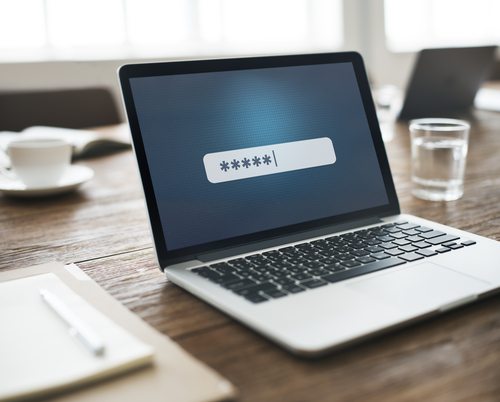Because we handle large volumes of sensitive information, The Records Company is dedicated to maintaining security at all levels. Our encryption and cybersecurity measures are state-of-the-art, and our staff undergoes rigorous training in privacy laws and security procedures to keep our clients’ information safe.
We combine security with convenience in our online portal for records retrieval, which allows you to submit requests and access your records from anywhere in the world, on nearly any kind of device. When you register for an account with us, it’s a quick process that requires you to enter your name, your company, and your email address. Then you set a password.
We all like to think our passwords are secure and impossible to guess or hack, but the research says otherwise. A 2017 study from Verizon revealed 80% of breaches involved weak or stolen credentials. Also in 2017, cybersecurity firm Preempt found 35% of us have weak passwords, and a lot of the standard protocols around “strong” passwords can be cracked. However, it’s not all gloom and doom. There are simple steps you can take to make your passwords—including the one you use for The Records Company—even more secure than it already is.
Avoid Personal Information
The top piece of advice from most experts is to avoid using a name or other bit of personal information that would be easy to guess (http://www.dw.com/en/the-top-ten-mistakes-that-make-life-easy-for-cyber-criminals/a-42788794). Still, too many of us are using our pets’ names, or our kids’ names, or the name of our favorite sports teams, or any other bit of information that might be easily deduced by a determined hacker. We use these terms because they’re easy for us to remember, but ease of use for us could mean ease of use for anyone.
Because so much information about ourselves, our lives, our loves, our preferences is available on social media, it’s even more critical to stay away from personal information in a password. It is possible to make a personal term more secure by using uppercase and lowercase letters and substituting numbers, or symbols, as many sites require, but even this may not be the most secure option. To make them easier to remember, many of our substitutions follow patterns, which makes the patterns easier to crack.
Avoid Words Altogether
One way to create a password that’s both secure and memorable is to turn a phrase into a mnemonic device of sorts. For example, you choose a phrase you know you can remember, such as “Mary had a little lamb.” That becomes “MaH4LiLa.” This password is reasonably secure because it uses uppercase and lowercase, is based on a random nursery rhyme instead of something from your life, and substitutes the numeral 4 for the letter A. The A and 4 switch is a fairly common substitution, but because it’s combined with other randomized ingredients in this password, it poses far less risk.
Longer Is Better
An alternative to the conventional advice to combine letters, numbers, and symbols unrelated to you is to create password that is a long string of words or a phrase. For example, a phrase such as “rolypolypuffykitty” is easy to remember and harder to hack because it doesn’t register as an actual word. These features also make it less essential for a long phrase or string of words to include the combinations of uppercase and lowercase lettering, numerals, and symbols that are often easy to forget. Of course, if you can remember to add some of those upper and lowercase letters, or numbers and symbols, so much the better, e.g. “r0lyp0lyfluffyki##y.” It’s still best to avoid personal information, like stringing together the names of all your siblings or children, but phrases such as obscure song lyrics or movie quotes might fit the bill, e.g. “thatrugreallytiedther00mtogether.”
Change It Up
Whatever method you use to generate a password, it’s a good idea to change it frequently. Every 90 days is the recommended benchmark. Also, if you’re using different passwords for every account you use, it’s best to generate all new passwords for everything instead of just rotating them between accounts. One way to help remember all those passwords for all those accounts is to reference the name of the site somewhere in them, such as “TRCMaH4LiLa” or “TRCrolypolypuffykitty.”
